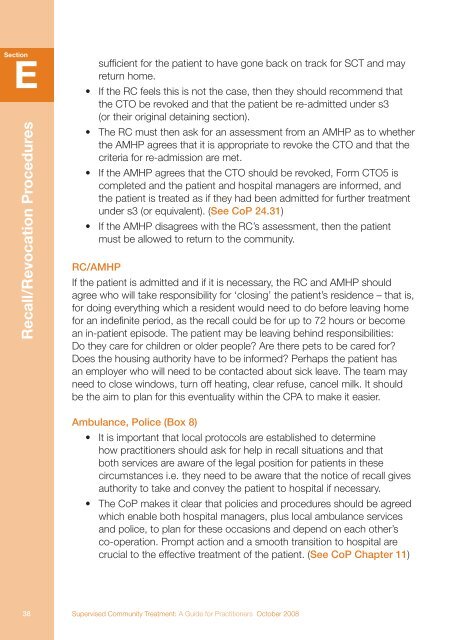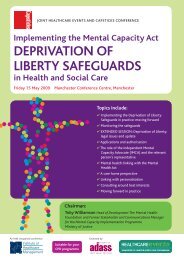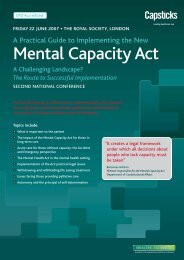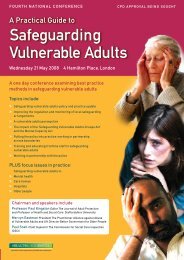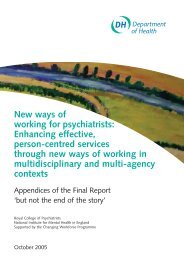Supervised Community Treatment: - Social Perspectives Network
Supervised Community Treatment: - Social Perspectives Network
Supervised Community Treatment: - Social Perspectives Network
Create successful ePaper yourself
Turn your PDF publications into a flip-book with our unique Google optimized e-Paper software.
Section<br />
Recall/Revocation Procedures<br />
sufficient for the patient to have gone back on track for SCT and may<br />
return home.<br />
• If the RC feels this is not the case, then they should recommend that<br />
the CTO be revoked and that the patient be re-admitted under s3<br />
(or their original detaining section).<br />
• The RC must then ask for an assessment from an AMHP as to whether<br />
the AMHP agrees that it is appropriate to revoke the CTO and that the<br />
criteria for re-admission are met.<br />
• If the AMHP agrees that the CTO should be revoked, Form CTO5 is<br />
completed and the patient and hospital managers are informed, and<br />
the patient is treated as if they had been admitted for further treatment<br />
under s3 (or equivalent). (See CoP 24.31)<br />
• If the AMHP disagrees with the RC’s assessment, then the patient<br />
must be allowed to return to the community.<br />
RC/AMHP<br />
If the patient is admitted and if it is necessary, the RC and AMHP should<br />
agree who will take responsibility for ‘closing’ the patient’s residence – that is,<br />
for doing everything which a resident would need to do before leaving home<br />
for an indefinite period, as the recall could be for up to 72 hours or become<br />
an in-patient episode. The patient may be leaving behind responsibilities:<br />
Do they care for children or older people? Are there pets to be cared for?<br />
Does the housing authority have to be informed? Perhaps the patient has<br />
an employer who will need to be contacted about sick leave. The team may<br />
need to close windows, turn off heating, clear refuse, cancel milk. It should<br />
be the aim to plan for this eventuality within the CPA to make it easier.<br />
Ambulance, Police (Box 8)<br />
• It is important that local protocols are established to determine<br />
how practitioners should ask for help in recall situations and that<br />
both services are aware of the legal position for patients in these<br />
circumstances i.e. they need to be aware that the notice of recall gives<br />
authority to take and convey the patient to hospital if necessary.<br />
• The CoP makes it clear that policies and procedures should be agreed<br />
which enable both hospital managers, plus local ambulance services<br />
and police, to plan for these occasions and depend on each other’s<br />
co-operation. Prompt action and a smooth transition to hospital are<br />
crucial to the effective treatment of the patient. (See CoP Chapter 11)<br />
Hospital Managers (Box 10)<br />
• They will need to ensure that they have the appropriately completed<br />
forms CTO3 (copy) and CTO4 (see Annex B).<br />
• They will need to note the time for the beginning of the 72 hour period,<br />
during which the patient may receive treatment whilst still on SCT and<br />
carefully monitor the length of stay.<br />
• They must ensure that no patient is detained following recall for longer<br />
than 72 hours from the time of admission, without revocation of the CTO.<br />
• If the hospital managers are informed that the patient’s CTO has been<br />
revoked, then they must immediately refer the case to the Tribunal.<br />
• Hospital Managers should ensure regular review of local agreements<br />
as SCT provisions, when patients are recalled to hospital, could<br />
give rise to possibly very urgent calls for assistance from ambulance<br />
services or police.<br />
• Hospital managers, at all times, have ongoing responsibility to safeguard<br />
the rights of the patient and to ensure that all administrative matters,<br />
in relation to the procedures and paperwork for SCT, are correct.<br />
AMHP (Box 11)<br />
• The AMHP must assess the patient to ascertain whether they agree<br />
with the RC’s assessment that the patient meets the criteria for<br />
detention, and that it is appropriate to revoke the CTO.<br />
• If the AMHP agrees, then the CTO is revoked and the patient can<br />
be treated under the normal rules for patients detained for treatment<br />
under the Act.<br />
• If the AMHP does not agree, then the patient cannot be detained<br />
in hospital after the maximum period of 72 hours and must be<br />
discharged back onto SCT.<br />
Expiry and extension of CTOs (sections 20A and 20B and regulations<br />
13 and 23)<br />
1. Unless extended, a CTO expires at the end of the six months starting on<br />
the day on which it is made. (So, if it is made on 1 January, it expires at<br />
the end of 30 June.) It can be extended for a further six months and then<br />
for a year at a time. At some point during the final two months of the first<br />
and each subsequent period for which the CTO is in force, the responsible<br />
clinician must examine the patient in order to decide whether the patient<br />
meets the criteria for extension. The responsible clinician may recall<br />
Section<br />
Recall/Revocation Procedures<br />
38 <strong>Supervised</strong> <strong>Community</strong> <strong>Treatment</strong>: A Guide for Practitioners October 2008<br />
October 2008 <strong>Supervised</strong> <strong>Community</strong> <strong>Treatment</strong>: A Guide for Practitioners 39


